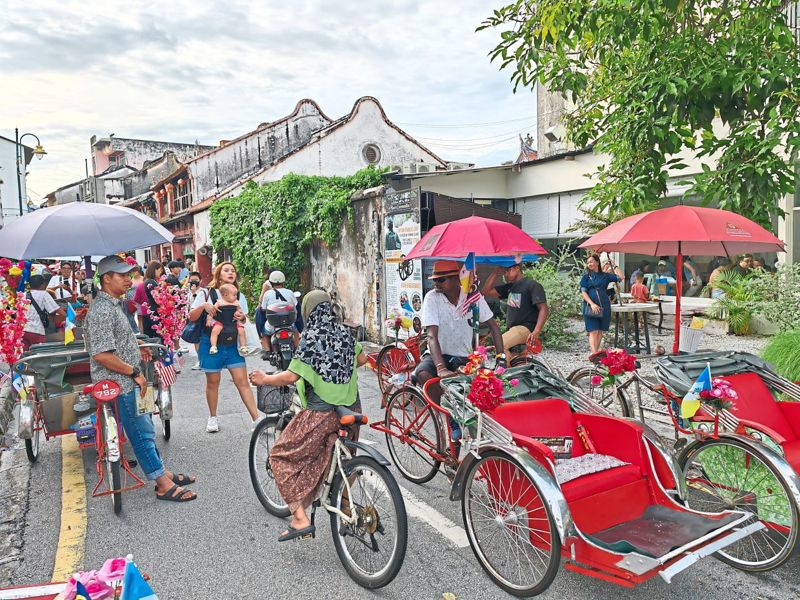
Lingua franca: Most Penangites, including those of other racial groups, can easily speak or at least understand Hokkien. — KT GOH/The Star
EVERY month, I routinely return to Penang. Although I’ve spent the last three decades in the Klang Valley, Penang remains my home since my 93-year-old mother and my siblings still live there.
Penangites are very parochial people and one thing that binds us is our unique brand of Hokkien.
When I started my journalism career at The Star in Penang, it was common for the daily editorial meetings to break into Hokkien with even my Malay and Indian colleagues using the dialect proficiently.
When many of us were transferred to Kuala Lumpur, the same pattern continued as the bulk of the newspaper staff was from Penang.
But all that has changed drastically as the dialect’s use has declined sharply over the years, with Mandarin taking its place. It’s not something that happened overnight, but it has almost been a decade or more since the shift began.
Whether one is at a shopping mall or even a coffee shop, it’s likely that Mandarin will be spoken by the staff with the assumption it’s universally understood.
But this uncle is a banana, which basically means an English-educated Chinese who can’t speak Mandarin and only thinks in and speaks English. Like the banana, I am yellow on the outside but white inside.
For older Penangites, and even northerners from Kedah and Perlis, as well as our friends from Taiping, Perak, our Hokkien is a heritage. It separates us from the rest of the ethnic Chinese in Malaysia because of our distinct northern-accented Hokkien.
As I have written in my past articles, it doesn’t matter whether we’re in Kuala Lumpur, Johor Baru, London or Timbuktu because we can always detect a Penangite in our midst whenever we hear this northern style dialect with its rich sprinkling of Malay words that denotes its nonya-baba linguistic roots.
Penangites are fiercely proud of their Hokkien as it’s completely different from the one spoken in Klang, Melaka, Johor, Singapore, Taiwan or Xiamen in China.
As older Penangites, perhaps we can be a little snooty, as we sometimes dismiss the Hokkien spoken elsewhere as somewhat crass and unrefined.
Only the Hokkien spoken by the Chinese community in Medan, Indonesia, and Phuket, Thailand, closely mirrors that of Penang Hokkien, presumably because of the proximity between Penang and the Indonesian city.
Rightly or wrongly, or plainly out of ignorance, Penangites feel the sing-song delivery sounds better.
Words such as balai (police station), balu (just now), bangku (stool), batu (stone), cilaka/celaka (damn it), campur (mix), jamban (toilet), gatai/gatal (itchy) gili/geli (creepy), sabun (soap) and kesian (pity), are an integral part of the Penang Hokkien dialect.
Even Penangites of other races can easily speak, or at least understand it. My fellow moderation advocate, Anas Zubedy, speaks excellent Hokkien. So do my fellow journalists like The Star’s Dorairaj Nadason and Bernama’s R. Manogaran, a former sports editor at The Star.
Then, there’s Tan Sri Syed Danial Syed Ahmad, the Keeper of the Rulers’ Seal, the person announcing the date of fasting and Hari Raya, who also speaks Hokkien, being a Penangite.
Last year, Penang Chief Minister Chow Kon Yeow said many Penang-born youth no longer speak Hokkien and the state government was now moving to address this to prevent the dialect from fading away.
The state has also approved an allocation to support an initiative by Han Chiang University College to produce a video on Penang Hokkien.
But it looks like a losing proposition.
In an interview with Penang Monthly, Penang Hokkien Language Association secretary Ooi Kee How was quoted as saying that “people think there’s no benefit in learning or speaking Hokkien, which is not true. Yes, you can survive if you do not speak Hokkien; you can get by with speaking only one language your entire life.”
“But the thing is, something will diminish. Our creativity, our cultural identity, will decline. A lot of innovations will disappear because different languages shape the way we think differently.”
The decline of Penang Hokkien is a result of a combination of factors. For one, a whole generation of Penangites have been educated in Chinese schools, at least at primary level.
This is unlike the older generation of Penangites like me, who are now in our 60s, who attended schools which used English as a medium of instruction. In the absence of Mandarin, we spoke mainly Hokkien and English, but Chinese in their 30s and 40s now find it more comfortable conversing in Mandarin – and for sure, not in English.
There’s also the impact of China as the new economic powerhouse of Asia, if not the world.
Mandarin has taken over the dominant spot as a language with economic value, and certainly prestige. That’s the reality, but it may well be at the expense of a rich heritage.
As a Penangite will say “aun juanh” (so, how?). Like many other languages around the world that have vanished, Hokkien is in danger of becoming a lost dialect, too.





